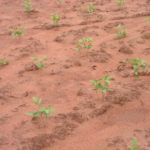


University of Malawi
Mozambique, Tanzania, and Malawi
8/2009—8/2011
Smallholder farmers in Malawi face significant challenges of small landholdings, depleted soils, climate variability, high input costs and limited access to markets. Production of maize, the main staple, has increased substantially since 2005 following implementation of a government subsidized seed and fertilizer scheme. There is recognition by government and farmers alike that the high maize production achieved over the past four years cannot be sustained economically or ecologically. Many of the policies and programs initiated in Southern Africa in recent years to improve soil fertility have focused either on increasing availability and accessibility to inorganic fertilizers, or ‘sustainable’ agriculture practices. However research points to the need for an integrated approach to soil fertility management (ISFM), combining different inputs for agro-ecological and socioeconomic niches. Policy-makers require ISFM recommendations that are evidence-based, consider performance over the long-term, promote efficient use of fertilizers and other inputs, and enhance smallholder abilities to cope with variability imposed by weather and markets. This project, implemented by Bunda College, compliments work of the Best Bets Legumes project to understand the economic viability of alternative ISFM practices and the best ways promote these to the farming community. This contributes to CCRP work to promote longer term sustainable system productivity.
Promising best bet ISFM technologies for different agro-ecological and socioeconomic niches identified for at least two districts in Malawi.Constraints and opportunities for increasing uptake and utilization, including economic incentives appraisedPathways for scaling up ISFM through government and NGOs extension assessed and strengthenedClimate variability on maize and legumes modeled in two districtsPolicy fora for development of ISFM/ fertilizer subsidy exit strategy catalyzed and supported.Policy briefs, web profiles produced for ISFM best bet technologiesTwo MS students trained in Agricultural Extension and Agricultural Economics
Promising best bet ISFM technologies for different agro-ecological and socioeconomic niches identified for at least two districts in Malawi.Soil fertility technologies practiced by smallholder farmers in Kasungu and Mzimba identified. These include inorganic fertilizers only (46%), compost only (10%), legume intercrop (8%), fertilizer/compost intercrop (23%).Most popular Legume Best Bet technologies practiced by smallholders on their farms (not mother or baby trials): Groundnuts + soya + maize (19%), maize + groundnuts (10%), maize + soya (8%), groundnuts + soya (7%) maize + pigeonpea (5%).Pit composting is the most common composting technology among farmers in Kasungu and Mzimba (32% farmers practicing).Most labour demanding technologies are: pit manure (27% farmers assessed it as very intensive), fertilizer (19%), khola manure (12%).Preliminary cost-benefit analysis estimates discounted Net Benefits of the technologies over two years as: Maize + fertilizer, MK17400; Maize + legume (with additional Urea), MK26400; Sole legume followed by sole maize, MK49,300.
